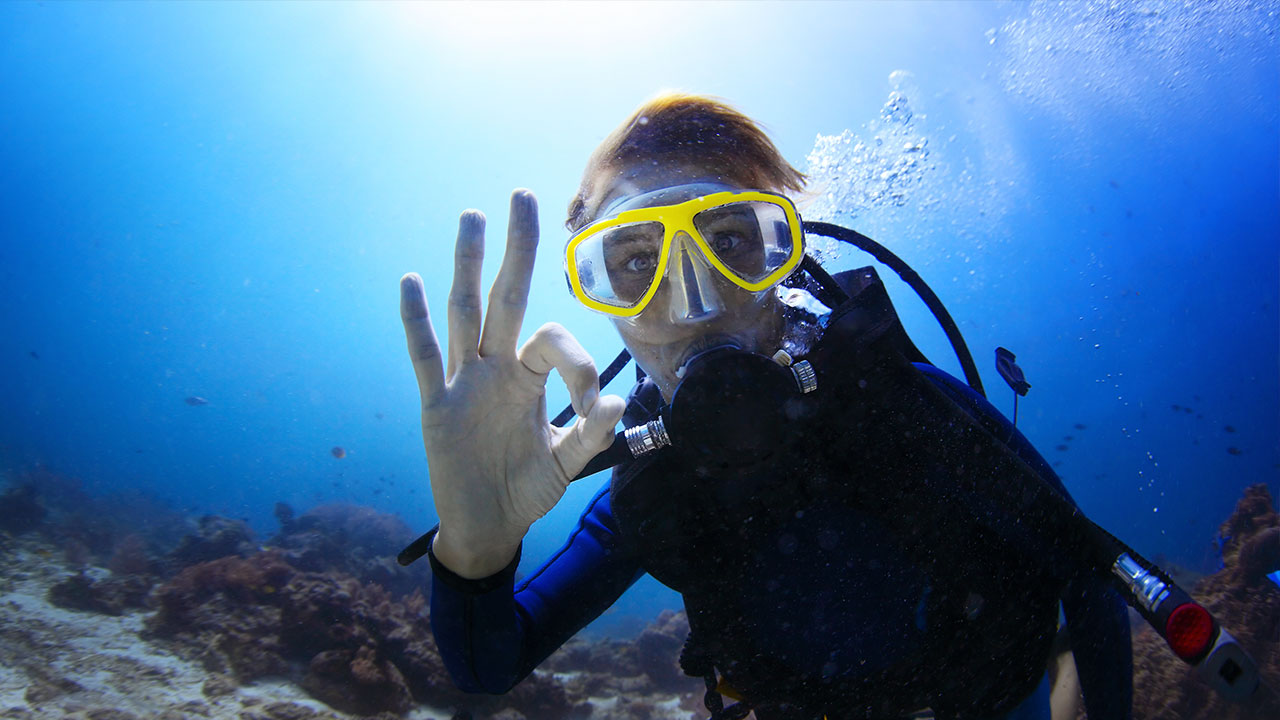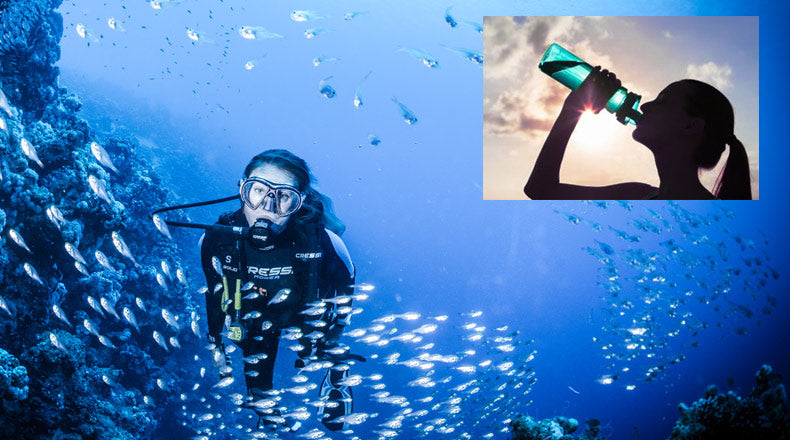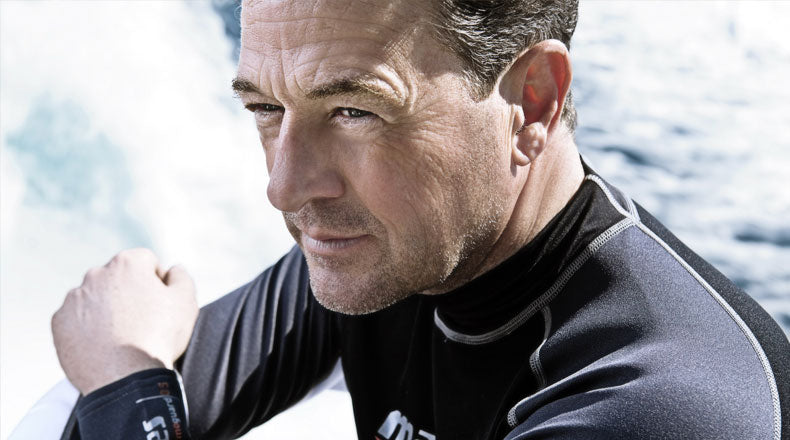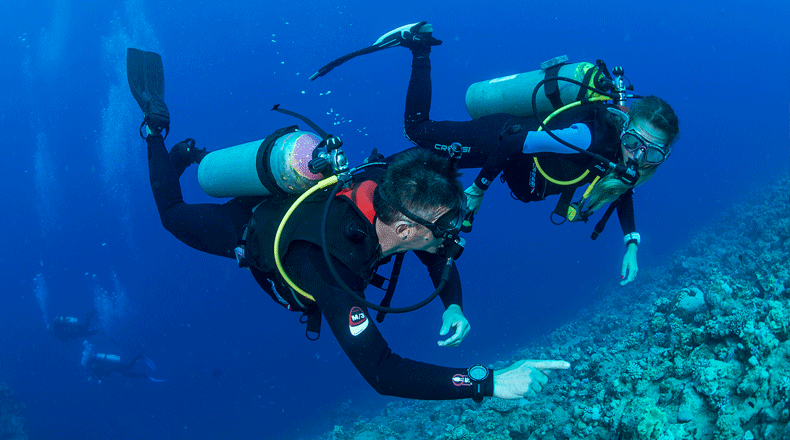Children and Scuba Diving

Diving is a wonderful activity for the family to do together - it encourages discovery, involves exercise and allows children and their parents to form an even closer bond through a shared experience. However, it is also important to remember that diving is associated with certain inherent risks. While with adults the amount of acceptable risk has been quantified, the question remains a subject of debate when it comes to young kids.
Most major dive organizations allow children as young as 8 to learn to scuba dive in a pool, while 10 years old is an industry-accepted minimum to become a certified scuba diver. At the same time, the usual approach in all things scuba is to stay on the conservative side, thus many dive instructors feel that teaching children to scuba dive means subjecting them to unnecessary risk.
That being said, there are currently no studies that could confirm or deny the medical and psychological concerns about kids in diving. Furthermore, the necessary type of research will, most likely, never be done as it is quite costly, would involve years of patient follow-up and, most importantly, is medically unethical.
Evidently, the decision, whether or not the child is ready to pursue the sport lies on the parents, instructors, and kids themselves. So, if you are contemplating the issue in question, consider the following arguments for and against allowing children to dive.
Arguments Against Children Diving
There are both medical and psychological arguments against children diving. Some of the physiological concerns include the partially open PFO in young or slowly developing children, equalization difficulties, increased risk of ear infection, etc. Possible psychological issues include lack of discipline, concrete thinking and inability to handle the stress of the underwater environment. Let’s look at each of these concerns in more detail.
1. Patent Foramen Ovale (PFO). A PFO is a passageway that exists between the upper heart chambers of an unborn fetus. This passageway allows the blood to bypass the not functioning lungs, and provide oxygen to the fetal circulation. After birth, a flap valve gradually closes and normally seals completely as the child matures. However, an estimated 25-30% of adults, as well as some young, or slowly developing children may still have a partially open PFO. While the condition does not create any issues in everyday life, it can theoretically be a problem in diving. A few medical reports have suggested that under increased thoracic pressure (common in a Valsalva maneuver), the partially open PFO can allow bubbles to move into arterial circulation. This, in turn, has led people to believe that PFOs may increase the risk of decompression illness. On the other hand, according to Divers Alert Network, the estimated risk of a DCI incident characteristic of those correlated with PFO is between 0.002-0.03 percent of dives.
2. Small, Flattened Eustachian Tube. Children, unlike adults, have small, flat, and horizontal eustachian tubes. This physiological peculiarity may result in two issues:
- difficulties with equalizing the air pressure in the middle ear, which may lead to severe pain and ruptured eardrums;
- water getting trapped in the ear canal, which leads to an increased risk of ear infections.
3. Concrete Thinking. Concrete thinking is a stage in a child’s cognitive development that lasts from around 7 to 11 years of age. Concrete thinkers are not capable of using logic and concepts to appropriately react to an unfamiliar situation. The ability to do this is called abstract thinking and develops only mid or late teens. In diving, for example, a child can memorize the necessary safety rules, but fail to apply them in an unforeseen emergency situation. Although most training agencies require that kids and young adolescents dive with an instructor or certified parent, it is not always possible for an adult to prevent a child from reacting to a situation in an inappropriate way.
4. Discipline and Responsibility. The child’s maturity, reasoning skills, and mental capabilities are crucial when it comes to diving safety. All kids and young adults pursuing scuba certification should have the discipline required to conduct the necessary pre-dive safety checks. It is also important to remember, that children, just like adult divers, are responsible for rescuing their buddies in case of an emergency. Keep in mind, children may not fully comprehend the risks associated with diving and/or consequences of them not following safe diving practices.
5. Other Unknown Effects. There is a range of other effects, such as increased pressure and nitrogen, that may or may not make a negative influence on the developing bodies of young children. Even though there is a lack of concrete evidence to support either side, many divers are not willing to take any risks when it comes to their children’s safety. After all, childhood and adolescence are a temporary condition and not a permanent contradiction to diving.
Arguments Supporting Children Diving
1. Activities like scuba diving allow to create a stronger bond between parents and children, make them closer to each other through something that they both enjoy doing. Diving parents can take their children on scuba holidays.
2. People who learn to dive at a young age are likely to be much more comfortable with it and perhaps even pursue a related career in the future.
3. Many scuba courses for children highlight the importance of marine life conservation, teach kids to care about the natural environment and help to nurture the lifelong commitment to protect our oceans.
4. Scuba diving courses help children to apply abstract concepts from physics, math, and natural science to the real world. This way kids can understand them better and learn to create similar associations in the future.
5. Managing risks associated with scuba diving can help children to develop a sense of personal responsibility, become independent thinkers and learn to deal with risks in other areas of life.
How to Determine if a Child Is Ready for Scuba Diving
PADI, in their book Children and Scuba Diving: A Resource Guide for Instructors and Parents, offers a set of questions to help evaluate whether the child is ready to enroll in a scuba diving certification course. If you can answer all of the questions below affirmatively, it is likely that your child will be able to handle the skills and understand the knowledge needed to scuba dive.
- Does the child want to learn to dive?
- Is the child medically fit to dive?
- Is the child comfortable in the water, and can he swim?
- Does the child have a sufficient attention span to listen to and learn from class discussions, pool and open-water briefings and debriefings and other interactions with an instructor?
- Can the child learn, remember, and apply multiple safety rules and principles?
- Are the child's reading skills sufficient to learn from adult-level material?
- Can the child feel comfortable telling an unfamiliar adult (instructor or divemaster) about any discomfort or not understanding something?
- Does the child have reasonable self-control and the ability to respond to a problem by following rules and asking for help rather than by acting impulsively?
- Does the child have the ability to understand and discuss hypothetical situations and basic abstract concepts like space and time?
Choosing an Appropriate Course and Dive Operator for Kids
Those parents who do decide to enroll their children in a scuba diving course should choose the dive center and instructor very carefully, as adequate oversight and training should not be taken for granted. Be sure to check the instructor’s experience and the reputation of the dive school.
Here are a few questions you may want to ask the dive operator before allowing your children to go diving with them:
- How long the instructor has been teaching scuba to kids, and what their certification is? (Don't hesitate to ask to see their C-cards)
- What is the student-to-instructor ratio?
- What are the depths and conditions of all dives? (Make sure the child won't be diving deeper than what is recommended for his/her age)
- Is there a first aid kit, oxygen unit, and a radio or a cell phone on board of the dive boat or nearby?
- Does the boat have a dropline and dive flag onboard?
As for the particular scuba programs available, there is a whole range of them for children of different ages and abilities.
Kids aged 8 to 12 can take part in such programs as Bubblemaker (PADI), SEAL Team (PADI) and Scuba Rangers (SSI). The students in these courses are confined to shallow water (usually no deeper than 12 feet) in a highly-controlled environment such as a swimming pool. Some of these programs offer different levels and specialty courses.
Staring at age 10 kids can become Junior Open Water Divers. Children who are willing to get certified need to perform all the same coursework and take the same examinations as adults. Even with a junior certification, children aged ten and eleven must always dive with a scuba certified parent /guardian or a dive professional, and never descend below 40 feet.
Kids aged 12-14 may go beyond the basic certification and take an advanced open water course or even become master scuba divers. They may not lead dives though or act as assistants to scuba instructors. Kids can upgrade their junior certifications to adult ones at age 15 without any further training.




